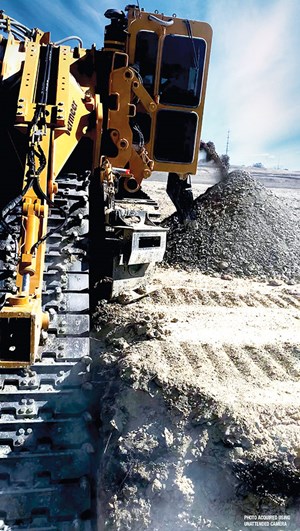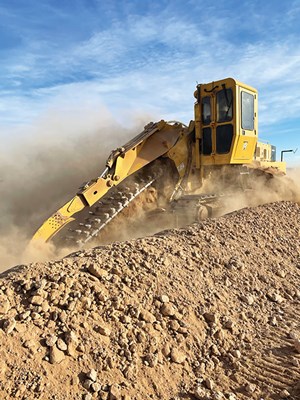May 2022 Vol. 77 No. 5
Features
Track Trenchers Provide Competitive Advantage for Contractors
By Maggie Moller
Contractors working in Texas know how challenging digging in the state’s ever-changing ground conditions can be. There are more than 1,300 different kinds of soil recognized in the state, but the condition contractors dread the most is rock. Limestone, shale, chalk, mudstone, sandstone, marl, conglomerate, paleosols — Texas has all of these sediment and rock types, and all can contribute to slow production.

But it doesn’t have to be that way. For example, two Texas contractors doing different applications of work have found adding track trenchers to their fleet has kept them ahead of schedule and on budget.
R & N Trenching
More than 12 years ago, Richard Bauman and his wife, Nola, established R & N Trenching Inc. in West Texas, a specialized trenching business supporting Texas’s massive network of pipelines.
“At the time, there were a few companies around Mertzon, Texas, where we’re based, running big track trenchers from time to time. But many of them tried to do as much as they could with excavators,” said Bauman. “It didn’t make much sense. I had a hard time understanding why companies didn’t invest in adding a trencher to their fleet. So, we launched a business offering trencher service.”
It didn’t take long before Bauman’s phone was ringing. A friend doing pipeline construction reached out even before the Baumans had a chance to acquire their first trencher.
“I contacted the Vermeer dealer in Midland and leased a Vermeer T1055 Commander 3 trencher,” he explained. “After three months of working that machine, the business was already going so well; I converted the lease into a purchase. Since then, we’ve expanded our fleet of trenchers, and now have two T955III and three T1055III trencher units.
When pipeline companies struggle to dig ditches in the area, R & N Trenching gets the call. And, unlike typical companies using excavators, the Baumans don’t need to send a large crew of people and equipment out to do the job. Instead, it’s one trencher, one operator and a support person or two to assist where needed.
“When we show up with a trencher, everyone else on the job has to be on top of their game to keep up,” Bauman said. “In conditions where the dirt sheds off the chain easily, we cut between 3,000 to 5,000 feet (914.4 to 1,524 m) a day. It would take three to four excavators going hard from sunup to sundown to open up that much ditch. Plus, they would have many more people out there doing the work.”
In harder rock, production output slows a bit, but Bauman says this is where trenchers really excel over excavators.
“We’ve shown up on a lot of jobs where other companies have brought in pairs of excavators working together in rock,” he explained. “One has a breaker on it and the other a bucket, and the two machines fight the rock all day pulling out chunky material that’s not good for anything.
“Meanwhile, our operator and our trencher are churning through rock steadily, and nice packable material is piling in a straight line right next to the cut.”
Lean times
Bauman does say that pipeline work has been lean the last couple of years, but he continues to keep his trenchers working in different parts of the state and into New Mexico, doing some electrical work for wind turbine farms.
“Laying the electrical lines for those turbines has similar requirements to pipelines, but many of the companies we’re subbing for in the renewable energy market, want us to go longer distances.”
R & N Trenching has done such an excellent job for renewable energy companies, Bauman has been asked to travel to other parts of the country to lay electrical lines.
“We don’t mind traveling when we have to, but we like West Texas and prefer to work in our own backyard. And lucky for us, we’re starting to see a few more area projects kick off,” he said.
Bauman’s crew recently started three projects involving oil and gas pipelines throughout the spring and summer. Most of the work is around Mentone, Texas, and ranges between 2.5 miles to 6 miles (4 to 9.7 km) of ditch per project.
Blue Star Utilities
Steve Hugdahl and Jose Guamancela, owners of Blue Star Utilities, LLC, based in Venus, Texas, are putting their Vermeer T1155 Commander 3 trencher to work in underground infrastructure expansion projects.
They have been doing utility construction work together for 20 years, but up until 2016, it was for other companies. Committed to doing quality work on time and on budget, the two founded Blue Star Utilities, focusing on building out the underground infrastructure for new housing subdivisions around the Dallas-Ft. Worth Metroplex.
It’s the first company working on-site for planned housing developments.
“We build out water, sewer and storm drainage systems and tie them into existing infrastructure,” explained Hugdahl. “To most people, using a huge track trencher for this type of work might seem out of place, but when we’re working around Ft. Worth and Anna, Texas, the rocky ground conditions can be a big challenge for big excavators.”
When the Blue Star Utilities team found itself in rocky conditions for the first couple of years of operations, the owners did what they could with excavators or renting a track trencher from the Vermeer dealership in Irving. Over the years, they realized they were more frequently renting trenchers, so they made the decision to purchase a T1155III trencher in January 2022.
“As our work took us further north, the rock we were digging in got harder,” said Hugdahl. “On top of that, we won bids on four sizable subdivisions, and we knew we had to make sure all our crews could work as quickly and efficiently as possible. Employing a trencher was the key to making that happen.”
Time efficiency
On the first subdivision they put the trencher to work on, Hugdahl said they were able to knock 60 working days off the project timeline.
“We understand the financial strain our development companies are working from,” he commented. “A lot of work needs to be done before the first property can be sold and profit starts to roll in. During that time, they are just writing out checks and paying interest to the bank, so, if we can get the first phase of the project done faster than someone else, it makes their decision about which company to go with much easier.”
Extended job timelines don’t just stretch out developers’ costs, either. Extra days and extra machines translate into additional labor, higher fuel costs and waiting longer to get paid if you’re a contractor. “Everyone benefits when the work can be done in less time,” Hugdahl said.
Before bidding on new projects, Hugdahl always looks over engineering geotech reports to determine when the work can get by with excavators and when using the trencher makes the most sense.
“Both Jose and I have spent too many years working around contractors who didn’t finish work when they said they would, and that’s not who we want to be. Having the trencher in our equipment fleet means we’re prepared for almost anything the area’s unforgiving ground conditions can throw our way,” he explained.
Blue Star Utilities has a big summer ahead. The team is working on several 400-to-500-lot subdivisions in Anna and Fort Texas.
“There’s going to be a lot of rock, and we’re ready for it,” concluded Hugdahl.
Grinding it out
Investing in large rock trenchers has helped R & N Trenching and Blue Star Utilities build solid reputations with the companies they do business with, instead of grinding it out with contractors trying to get by with excavators alone.
And, with the tight labor market contractors face, these two companies are accomplishing more with fewer people. That is the advantage of investing in a trencher when doing underground construction work in Texas. •
ABOUT THE AUTHOR: Maggie Moller is a product marketing and training specialist at Vermeer Corporation.
FOR MORE INFORMATION:
Blue Star Utilities, (817) 539-9950, bluestarutilities.com
R & N Trenching, (325) 835-7098
Vermeer Corp., (888) 837-6337, vermeer.com





Comments